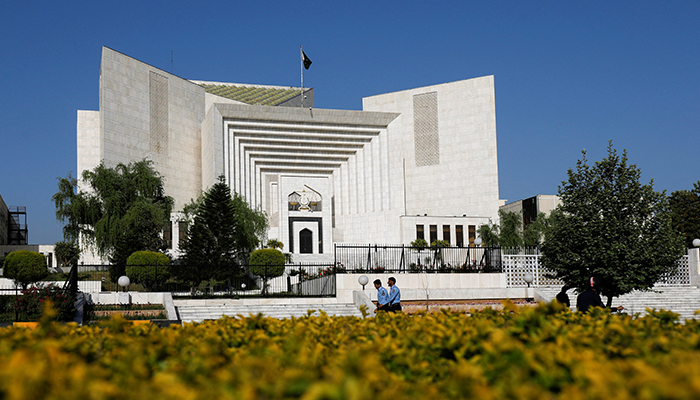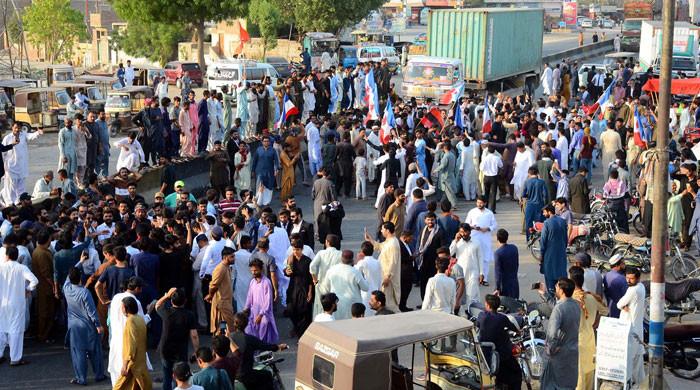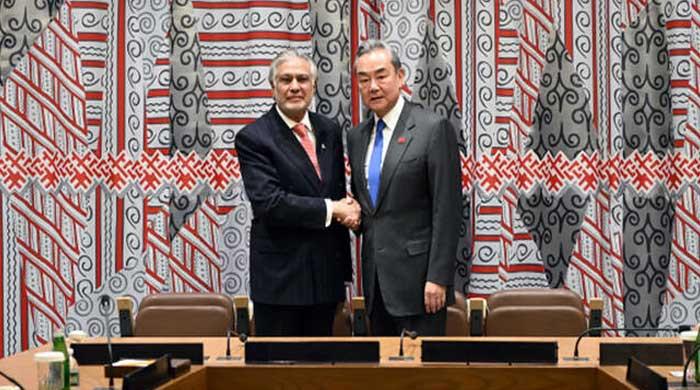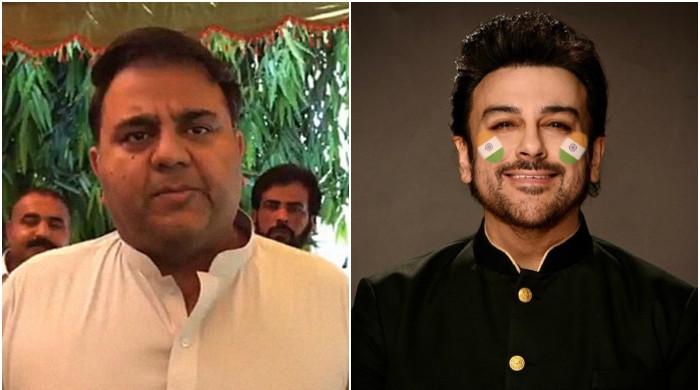Back to April 3: Supreme Court declares deputy speaker’s ruling null and void, restores National Assembly
SC says PM was bound by Constitution and couldn't advise president to dissolve assemblies
April 07, 2022

- SC declares NA deputy speaker’s ruling unconstitutional.
- National Assembly has been restored.
- PM’s advice to dissolve National Assembly declared null and void.
- SC orders President Arif Alvi to convene NA session on April 9.
- Voting on no-confidence motion to held no later than 10:30am on Saturday.
ISLAMABAD: The Supreme Court of Pakistan restored the National Assembly Thursday after it declared the government's decision to dissolve the assembly and NA Deputy Speaker Qasim Suri's ruling against the Constitution.
The top court has ordered National Assembly Speaker Asad Qasier to summon the session on Saturday (April 9) no later than 10:30am to allow the vote on the no-confidence motion against the premier.
"In consequence of the foregoing, it is declared that at all material times the Prime Minister was under the bar imposed by the Explanation to clause (1) of Article 58 of the Constitution and continues to remain so restricted. He could not, therefore, have at any time advised the President to dissolve the Assembly as contemplated by clause (1) of Article 58," the court's order read.
"In consequence of the foregoing, it is declared that the advice tendered by the Prime Minister on or about 03.04.2022 to the President to dissolve the Assembly was contrary to the Constitution and of no legal effect," said the order.
The Supreme Court also "declared that the assembly was in existence at all times, and continues to remain and be so".
The apex court also stated that the speaker cannot prorogue the assembly and bring the session to an end if the no-trust motion fails or after a new prime minister is elected if a no-confidence motion is passed.
The court ruled that no member will be barred from casting their vote. It also stated that if the no-trust motion fails then the government will continue to carry out its affairs.
"...if the no-confidence motion against the prime minister succeeds, then the assembly will appoint the new prime minister," the top court's order said.
Chief Justice of Pakistan Umar Ata Bandial had earlier said that the court will move forward only after seeing national interest and practical possibilities.
The chief justice had noted that the deputy speaker's ruling is, prima facie, a violation of Article 95, as the apex court resumed deliberation over the "unconstitutional" act by Suri for the fifth consecutive day today.
The apex court's five-member larger bench — headed by Justice Bandial and comprising Justice Muneeb Akhtar, Justice Aijazul Ahsan, Justice Mazhar Alam, and Justice Jamal Khan Mandokhel — heard the case and then later issued the ruling.
'Democracy is the best revenge': Bilawal
Reacting to the decision of the top court, PPP Chairman Bilawal Bhutto-Zardari took to Twitter and celebrated the Opposition's win by writing: "Democracy is the best revenge."
'Prime Minister Shahbaz Sharif Insha Allah': Maryam
Akin to that, PML-N Vice President Maryam Nawaz took to the microblogging website and expressed her gratitude to God for the Opposition's win.
"I congratulate the nation as the supremacy of the Constitution has been restored," she wrote. "Those who had violated the Constitution are done away with. May Allah keep Pakistan shining.
She also hailed her uncle, PML-N President Shahbaz Sharif, and wrote that he would be the next premier.
'Constitution saved': Shahbaz
Talking to media personnel, Opposition Leader in the National Assembly Shahbaz Sharif said the top court's decision was in line with the expectations of the masses.
"The Constitution has been saved and Pakistan has been saved through this decision [...] the court has upheld its independence and respect," the Opposition leader said.
He thanked the top court for its unanimous decision to strengthen the parliament and its sovereignty.
"We will no fight the battles of economy and politics for the people."
Opposition to observe 'Youm e Tashakkur': Fazl
Speaking to journalists along with Shahbaz, JUI-F chief Fazlur Rehman congratulated the nation and said that the decision of the SC was a win for the country's Constitution.
Fazl announced that the Opposition will be observing a day of gratefulness "Youm e Tashakkur' tomorrow.
"May Allah help us steer this country out of the economic turmoil," he said.
'Unfortunate decision exacerbated political crisis': Fawad
Reacting to the decision of the Supreme Court, the Minister for Information and Broadcasting Fawad Chaudhry expressed his regret and disappointment, terming the verdict "unfortunate".
Taking to Twitter, he wrote: "This unfortunate decision has exacerbated the political crisis in Pakistan. Immediate elections could have brought stability to the country. Unfortunately, the importance of the people has been overlooked. Let's see how things go now."
'Parliament should be restored’: PML-N
During the hearing of the case earlier in the day, Shahbaz Sharif was called to the rostrum, where he said that if the court acknowledges that the ruling of the deputy speaker was “erroneous”, then it should restore Parliament.
Shahbaz further highlighted that if the deputy speaker’s move was unconstitutional then decisions taken by PM Imran Khan with the help of President Arif Alvi are also “insignificant”.
“The no-confidence motion against PM Imran Khan will automatically be restored once the apex court rules out the ruling of the deputy speaker,” he said.
Calling the ruling of the deputy speaker “unconstitutional and illegal”, the PML-N leader said that voting was to be held on April 3 and “constituencies cannot be dissolved during the proceedings”.
He highlighted that several government allies and MNAs joined the Opposition, assuring the five-member bench that the joint Opposition will protect the Constitution of Pakistan.
CJP Bandial said that the proceedings of the court are being held under Article 184 (3) as this is a public interest case.
Shahbaz further added that political stability is inter-connected with the Constitution of Pakistan.
During the cross-questioning session, Justice Mandokhel asked Shahbaz that the Opposition has been demanding fresh elections and now that they have the opportunity, why are they against it?
Replying to his question, Shahbaz said that the election has been “stolen” and laws of the Constitution have been “violated”; to which Justice Mandokhel said that all laws that have been violated will be restored.
AGP not willing to defend deputy speaker’s ruling
During the hearing this afternoon, AGP Khalid Jawed Khan excused himself from defending NA Deputy Speaker Qasim Khan Suri’s April 3 ruling.
Khalid Jawed Khan argued that his focus is on new elections in the country. "Those who have been dubbing the assembly as selected for the past four years now wanted to become the prime minister of the same assembly," he added.
Meanwhile, Jamal Khan Mandokhail noted that it seemed that the speaker issued the ruling considering himself above all others.
CJP raises objection over missing names of officials from PNSC meeting minutes
Naeem Bokhari, the counsel representing National Assembly (NA) Speaker Asad Qaiser and Deputy Speaker Qasim Suri, presented the minutes of the Parliamentary Committee on National Security's (PCNS) meeting in the SC.
During the hearing, CJP Umar Ata Bandial asked who the participants were of the PCNS meeting and who briefed them.
Responding to the query, Bokhari said that the national security adviser briefed the meeting.
At this, CJP Bandial objected that 11 people attended the meeting as per the record, but the names of officials who briefed the meeting are not present in the minutes.
CJP Bandial noted that NSA Moeed Yusuf's name was also missing from the minutes.
Justice Mandokhel inquired if the foreign minister attended the meeting or not.
"It seems like the FM wasn't present at the parliamentary committee's meeting," Bokhari said.
While responding to the court's objections over the absence of the foreign minister at the PCNS meeting, Bokhari said that AGP Khalid Javed will give a briefing on what happened in the meeting.
CJP Bandial objected that 57 members attended the PCNS meeting on March 31, and those who sided with the Opposition might have informed them about the matters discussed there.
He asked if the former minister for the law should have sought the Opposition's response instead of the deputy speaker's ruling on points of the order.
At this, Bokhari said that the points of order are not debatable.
However, the chief justice noted that the other party can be given a chance to speak as per the NA rules but it wasn't allowed despite the option.
'SC shouldn't look into this case anymore': Bokhari
While starting his arguments, Bokhari said that he would maintain Barrister Ali Zafar's arguments.
"New elections have been announced, now the people have to decide," Bokhari said, suggesting that the SC shouldn't look into this matter anymore.
Justice Mandokhel inquired if the speaker blocking the vote of no-confidence is Constitutional manipulation.
Justice Ahsan inquired if the pending resolution of no-confidence can be rejected after the point of order is presented.
At this, Bokhari responded positively, saying that the speaker has the jurisdiction to reject the motion over a point of order.
He, however, said that such a situation has never occurred before.
"The point of order can be taken in any situation including a no-confidence motion."
Bokhari said that former minister Fawad Chaudhry asked for the point of order immediately after the session commenced because it couldn't be done if the voting started.
"The speaker has the authority to add anything he wants to the agenda," he added.
At this, Justice Mandokhel inquired if being on the agenda doesn't mean that the no-confidence motion is to be voted upon.
He said that the procedure for any other action of parliament is not mentioned in the constitution except for the no-confidence motion.
"Can the constitutional process be stopped on the basis of Assembly Rules? Can the Speaker deviate from the constitutional process? Can any action be taken against the speaker for deviating from the constitutional process?"
At this Bokhari said that the constitution is silent on various aspects and legislation is done for such matters.
He said that whatever happens within Parliament has constitutional immunity.
Justice Akhtar remarked that the part of Suri's ruling where he rejected the no-confidence motion is against the Constitution.
"The Constitution orders that voting on the no-trust motion is mandatory."
"The court has to make the final decision to which extent it can interfere but our stance is that the speaker's ruling cannot be reviewed [by the court]," said Bokhari to conclude his arguments.
During the hearing, Bokhari discussed the question and answer session in the NA after the no-trust resolution against Prime Minister Imran Khan was presented, saying that all the Opposition parties' members said that they don't have any questions.
They only asked for voting after which the NA speaker adjourned the session due to a ruckus.
‘Want to bring electoral reforms': PPP
When called to the rostrum, Bilawal Bhutto-Zardari told the five-member bench that the Opposition wants to bring electoral reforms by forming a government.
“Forming a government for our benefits is not our priority,” he stated. Replying to CJP’s question regarding a bill on electoral reforms, Bilawal said that a bill on electoral reforms is already drafted.
He further said that the “unconstitutional” ruling of the deputy speaker raises questions regarding the country’s democracy.
CJP Bandial further said that the judges acknowledge the three generations of the Bhutto family have sacrificed for the survival of democracy; however, he added that the judges should be allowed to issue the verdict strictly in line with the Constitution.
AGP asks for in-camera briefing on NSC meeting's minutes
Attorney General for Pakistan (AGP) Khalid Jawed Khan apprised the top court that the leave was granted to move the no-trust motion against the prime minister on March 28 by the Lower House.
The attorney general maintained that the military leadership was present in the National Security Committee (NSC ) meeting, adding that the participants of the meeting were briefed on “very sensitive issues”.
He maintained that he could not give his arguments over the minutes of the NSC meeting in open court. He, however, offered to give an in-camera briefing to the court on the minutes of the NSC meeting.
Continuing his arguments, he said there were 161 MNAs in the assembly when the leave was granted on March 28, adding that “172 lawmakers are required for the no-confidence motion to succeed.”
He maintained that the no-confidence had already been dismissed on March 28.
'Casting vote of no-trust not a basic right of MNAs'
The attorney general maintained that the prime minister has the power to dissolve the assembly as he is the chief stakeholder, adding that it is not necessary to give a reason for dissolving the NA.
“The assembly will dissolve itself after 48 hours if the president did not make a decision on the prime minister’s advice,” he added.
“Casting a vote on the no-confidence motion is not the basic right of any MNA,” he said, adding that the right is linked with the Constitution and the assembly rules.
“Are you saying that right is linked with rules under Article 95?” asked the CJP.
The AGP said that the government is formulated in the House and the Constitution talks about the five-year term of the House, but not of its members. If the speaker suspends any member, he cannot move the court against the decision, he added.
President Alvi's counsel presents arguments
At the outset of the hearing, Barrister Ali Zafar, representing President Arif Alvi, came to the rostrum and assured the court of completing his arguments within 10 minutes.
Meanwhile, Senator Azam Nazeer Tarar resumed his arguments saying: "A dictator once said that the Constitution is a book of 10-12 pages, I can tear it at any time."
"A very alarming situation took place in Punjab last night as PML-N leader Hamza Shahbaz was made Chief Minister at Kunji Hotel," Tarar said.
Tarar informed the court that Hamza, who is the former Punjab governor, will take oath as the chief minister at Bagh-e-Jinnah, Lahore today.
"Don't make speeches, we do not want to get into Punjab's affairs," CJP Bandial rebuked Tarar.
The judge said that the Lahore High Court would look into this provincial affair.
Parties should settle matter on their own: CJP
"The parties of the case should settle the matter on their own through mutual consultation," CJP Bandial remarked.
Giving his arguments, Barrister Zafar said that proceedings of both Houses of Parliament have separate privileges.
CJP Bandial asked if the NA proceedings did not have an effect on the situation outside of Parliament in this case.
"The court can intervene if any action has an effect outside Parliament," the CJP remarked.
Meanwhile, Justice Alam inquired if any unconstitutional act in Parliament has constitutional immunity.
Whereas, Justice Mandokhel asked if there isn't any solution if an unconstitutional act takes place in Parliament.
At this, Barrister Zafar replied that Parliament has to solve the issue and the solution is to go to the people [election].
Referring to a past judgement, Zafar said that a member in the House of Commons wasn't allowed to take oath as the court declared that it cannot interfere.
At this, CJP Bandial asked what should be done if there is injustice in Parliament.
"Is the formation of federal government an internal affair of Parliament?" he asked.
In his response, Barrister Zafar said that the election of a prime minister or a no-confidence motion "is an internal affair of Parliament."
"The NA is constituted to elect its speaker and prime minister. However, the court can review the formation of federal government and dissolution of assembly" he added.
At this CJP Bandial said that it would have been determined who will be the premier had the vote of no confidence against PM Imran Khan held.
Meanwhile, Justice Mandokhel noted that Parliament is responsible for legislation.
"What would happen if Parliament doesn't legislate?” he asked.
To this, Barrister Zafar said that the old laws would stay in place if legislation is not done.
Zafar calls for decision favouring new election
Democracy and election cannot be put asunder, Barrister Zafar said, adding that voters are the most empowered.
Referring to the end of the Mohammad Khan Junejo-led government, Zafar said that the court had declared it anti-Constitutional.
"The court declared that the people will decide as the matter is going towards election,” Zafar said, requesting the apex court to rule that the decision be left to the people of Pakistani even if an illegal act has been done.
Justice Alam noted that the court has the case of no-confidence in front of it, directing Zafar to address the speaker's ruling that came after the resolution of no-confidence was tabled.
At this, Zafar said that the dissolution of the Assembly was announced in the current case as well.
No constitutional crisis in Pakistan: CJP
Meanwhile, CJP Bandial asked Zafar to share what the constitutional crisis is.
"Where is the constitutional crisis if everything is happening as per the Constitution? There is no constitutional crisis in Pakistan," the top judge remarked.
He noted that the speaker's ruling is apparently a violation of Article 95.
"Can anyone call a new election by giving a ruling if they are failing? Billions of rupees are spent on elections," CJP Bandial remarked.
Speaker's ruling enjoys immunity under Article 69: AGP
Attorney General Khalid Javed Khan will argue in today's hearing whether the SC can intervene in the internal affairs of the NA.
The AGP had earlier said on a private TV show that the NA speaker's ruling enjoys immunity under Article 69 only if there is a procedural irregularity, but the court has the jurisdiction to intervene in parliamentary affairs if there is unconstitutionality.
"The speaker's role is not unlimited,” he had said.
When asked if the NA speaker can give an extra-constitutional ruling on whatever he wants, he said that there are certain things that are part of the basic constitutional structure of Pakistan and those cannot be changed even through a constitutional amendment.
"As long as the NA's internal affairs and speaker's rulings are on a much lower pedestal [...], the apex court cannot intervene if Parliament unanimously wants to amend anything," he said, adding that this is not so in case of violation of fundamental rights.
During Wednesday's hearing, the counsel representing PTI and President Arif Alvi presented their defence.
Babar Awan presented arguments over the constitutionality of Suri's ruling, while Arif Alvi's lawyer Ali Zafar deliberated over the boundary between the judiciary and the legislature under Article 69 of the Constitution.
"The SC wants to wrap up the case today," Chief Justice of Pakistan Umar Ata Bandial had said, as the apex court resumed hearing the case on Wednesday.
“We first want to wrap up the case on what happened in the NA on April 3."
SC takes suo motu notice
The CJP had taken suo motu notice of the constitutional crisis that was triggered after Suri disallowed voting on the motion on April 3, deeming it "unconstitutional" — a move that the Opposition said was a blatant violation of the Constitution.
The judge maintained in a written judgment issued during Sunday's hearing that his fellow judges had approached him and had expressed concern over the situation.
"Any orders and actions that Prime Minister Imran Khan and President Arif Alvi regarding the dissolution of the National Assembly shall be subject to the order of this court," CJP Bandial had said taking the notice on Sunday.
Earlier, the SC restrained state institutions from taking any extra-constitutional steps and directed them to act strictly in accordance with the Constitution, besides asking all political forces of the country to remain peaceful.
Opposition's petition
The joint Opposition has also prepared a petition to cancel the ruling of the deputy speakers under which the National Assembly session was adjourned for an indefinite period as Suri cancelled the voting on the no-confidence motion, terming it “unconstitutional”.
According to the petition prepared by the joint Opposition, the speaker should be directed to convene the session today as “the deputy speaker cannot adjourn the session as it is unconstitutional.”
Furthermore, the Opposition has filed a petition against President Arif Alvi, PM Imran Khan, Speaker NA Asad Qaiser and Deputy Speaker Qasim Suri for violating the Constitution.
SCBA's petition
Meanwhile, Supreme Court Bar Association (SCBA) has also filed a petition in the Supreme Court on the constitutional crisis.
The constitutional petition filed by SCBA states that a voting of no-confidence motion was a must, and the speaker cannot cancel the voting by a ruling.
It was further noted that the deputy speaker’s ruling contradicts Article 95(2). It further said that according to Article 58(1) the premier cannot even “advise dissolution of the assembly,” once the no-confidence motion is filed against him/her.
Sources privy to the matter said that a special bench of the top court will hear the case.












